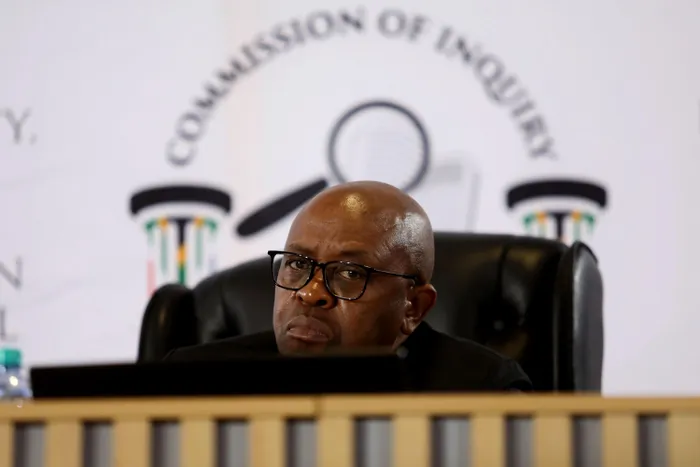Madlanga Commission focuses on witnesses supporting Mkhwanazi’s explosive testimony

Retired Constitutional Court Justice Mbuyiseli Madlanga’s judicial commission of inquiry into criminality, political interference, and corruption in the criminal justice system now turns to witnesses who will support KwaZulu-Natal Police Commissioner Lieutenant-General Nhlanhla Mkhwanazi’s explosive evidence.
Image: Oupa Mokoena / Independent Newspapers
The Madlanga Commission of Inquiry’s legal team is expected to shift its focus to witnesses who will corroborate KwaZulu-Natal Police Commissioner Lieutenant-General Nhlanhla Mkhwanazi’s explosive evidence of malfeasance in the country’s criminal justice system.
Mkhwanazi spent three days this week at the Brigitte Mabandla Justice College in Tshwane detailing widespread allegations of wrongdoing within the SA Police Service and some of its most senior officers, the Johannesburg and Ekurhuleni metropolitan police departments, the National Prosecuting Authority, and related institutions such as the Independent Directorate Against Corruption.
Police Minister Senzo Mchunu and two of his predecessors, Nathi Mthethwa and Bheki Cele, as well as suspended Lieutenant-General Shadrack Sibiya, the deputy national police commissioner for crime detection, among others, were also not spared during Mkhwanazi’s testimony.
In the outline of its plans, the judicial commission of inquiry into criminality, political interference, and corruption in the criminal justice system, chaired by retired Constitutional Court Justice Mbuyiseli Madlanga, is now scheduled to hear evidence from witnesses who will corroborate the allegations made by Mkhwanazi.
According to the commission, the witnesses include but are not limited to National Police Commissioner General Fannie Masemola, members of the political killings task team, detectives involved in the investigations, prosecutors, and various experts.
In the next phase, the commission will proceed to rigorously test the evidence and, where applicable, assess rebuttals to the allegations presented earlier.
“Individuals and institutional representatives implicated by Lt-Gen Mkhwanazi’s statements and evidence – including, for instance, the suspended Minister of Police – will be invited or, if necessary, compelled to appear before the commission and provide testimony,” the legal team explained.
The commission has undertaken to objectively examine the allegations and allow those named a fair opportunity to offer their explanations or refute the claims made against them, with each individual or entity called upon to address the specific matters relevant to their conduct.
It will also carefully evaluate the evidence submitted by various parties, whether justifying their actions or challenging the assertions made.
Its evidence leaders will subject all accounts to thorough scrutiny, cross-referencing them with the earlier testimony, as well as any independent material the commission has obtained.
The commission indicated that this phase is critical for fairness as it will ensure that those implicated are heard and that it does not rely solely on one side of the story.
“It is effectively a process of confronting the allegations and seeing whether the initial claims bear scrutiny,” the legal team stated.
The commission will then recall Mkhwanazi and other key witnesses to address the perspectives and counter-allegations presented by those implicated during the preceding phase.
Mkhwanazi will be allowed to respond directly to any conflicting accounts, clarify points of contention, and, where necessary, offer additional evidence or context.
Should new witnesses or evidence emerge warranting further scrutiny, the commission has promised to address them, and evidence leaders aim to provide a full and balanced evidentiary record, having duly considered all perspectives and resolved outstanding questions as far as possible.
The commission will also remain adaptable, following investigative leads as they arise, and if the necessity for additional expert testimony or in-depth review of particular case files arises, it will make the appropriate accommodations to ensure thoroughness and fairness.
Towards the end of its processes, the commission may invite final written submissions from interested parties or their legal representatives to offer them the opportunity to highlight specific evidence or legal arguments for consideration.
“The overarching objective is to facilitate a fair, exhaustive, and impartial inquiry, ensuring that every material aspect is addressed before the final drafting of findings and recommendations,” the legal team further stated.
In the meantime, Mkhwanazi is set to meet the evidence leaders of the Ad Hoc Parliamentary Committee into the allegations he has made, next Thursday and Friday.
The Ad Hoc Committee, which also wants Mkhwanazi as its first witness, has already consulted Masemola, Mchunu, Acting Police Minister Professor Firoz Cachalia, and his two deputies, Cassel Mathale and Polly Boshielo.
Sibiya has requested that he be engaged virtually rather than in person - a matter to be addressed by the Ad Hoc Committee’s legal team.
A request for Cele’s appearance has also been sent.
loyiso.sidimba@inl.co.za